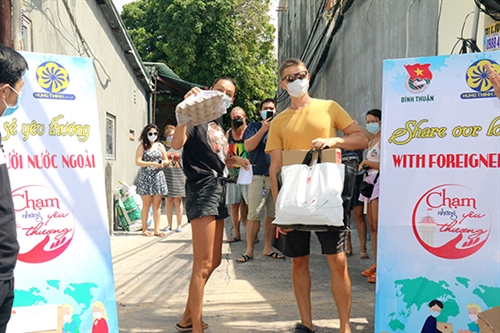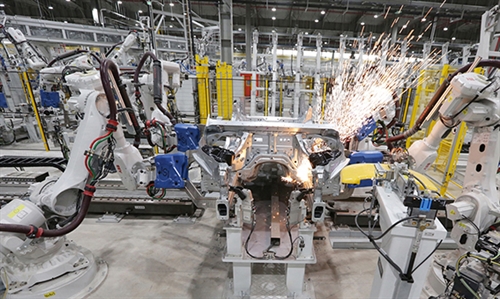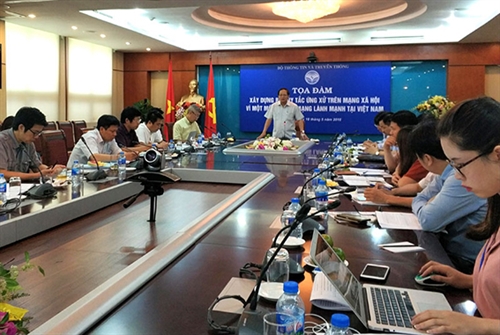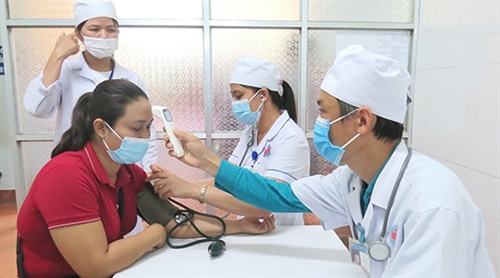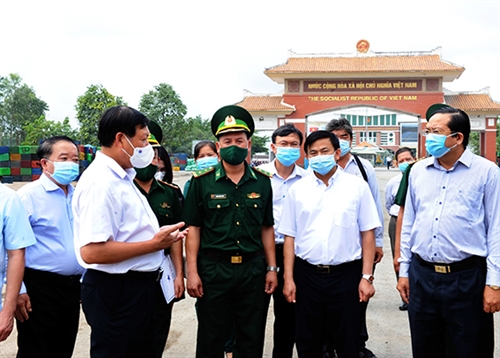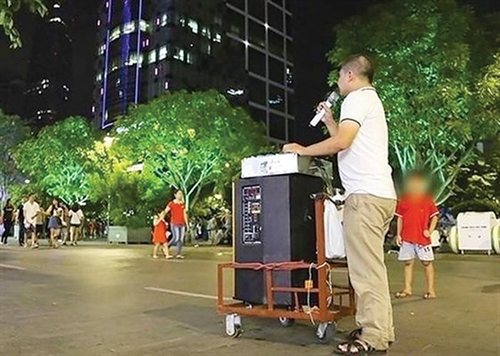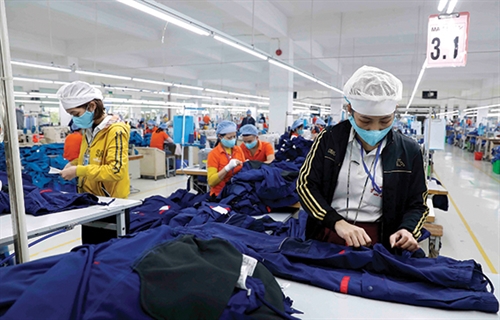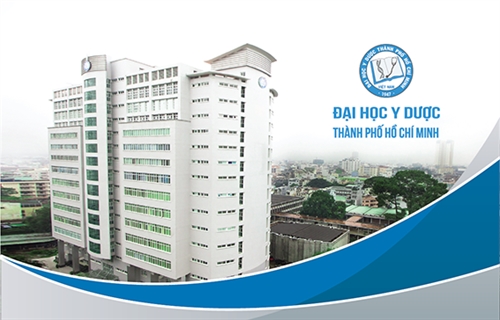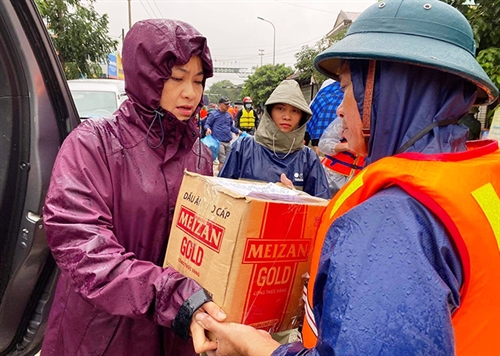Early this month, many local media outlets reported that a shipment of more than 22,000 powder milk cans that were emergency relief gift from the Vietnamese community in Australia for underprivileged children in Ho Chi Minh City during the outbreak of the COVID-19 pandemic had been stuck at customs warehouses for nearly a month and could not be taken out.
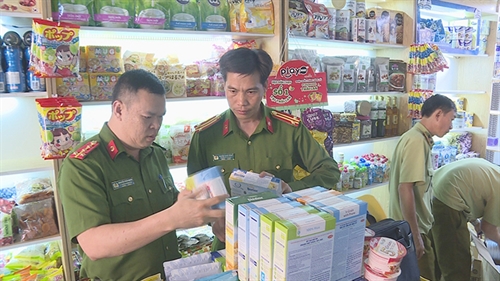 |
| On Jan. 16, functional forces of Dak Lak province inspect a grocery store in Buon Ma Thuot city, detecting nearly 4,000 law-violating items__Photo: VNA |
The news, which was released by National Assembly delegate To Thi Bich Chau, who is the Chairwoman of the Ho Chi Minh City Fatherland Front Committee, during a discussion at the second session of the 15th National Assembly on November 9, immediately aroused public concern.
The story started in October when the shipment arrived in Ho Chi Minh City. As the shipment contains imported milk products which, according to current regulations, are subject to animal quarantine as well as registration of product quality declaration and state inspection of food safety, the Ho Chi Minh City Fatherland Front Committee, the focal point authorized by the donor to receive the shipment, sent two official letters to the Ministry of Agriculture and Rural Development’s Department of Animal Health and the Ministry of Health’s Vietnam Food Administration to ask for exemption from these procedures. The Department of Animal Health replied after two days while the Vietnam Food Administration requested the Ho Chi Minh City Fatherland Front Committee to seek opinion of the Government or Prime Minister. As a result, the shipment was stuck at customs offices.
Explaining the reason for her agency’s action, Deputy Director of the Vietnam Food Administration Tran Viet Nga said, according to Government Decree 15/2008/ND-CP guiding the Law on Food Safety, the shipment is not eligible for exemption from state inspection of imported food, unless it is so agreed by the Government or Prime Minister in case of importing goods in urgent circumstances.
“The Vietnam Food Administration does not have the power to decide on the case and hence we recommend the Ho Chi Minh City Fatherland Front Committee to ask for opinion of competent authorities,” Nga told the local press.
So, it is clear that concerned state agencies act in compliance with regulations. The problem here is if everything is properly done, why the relevant stakeholders do not satisfy with the result and in this case, should we review the regulations?
Reforming regulations for the sake of convenience
When asked about his views on the case of “stuck” relief goods at a press conference held after the second session of the 15th National Assembly, Vice Chairman of the National Assembly’s Committee on Social Affairs Nguyen Hoang Mai said: “This happened due to shortcomings on the part of related units in the course of implementation of relevant regulations. The Government will acknowledge the problem and draw experience in the coming time.”
In fact, the case was just sort of the last straw. As mentioned above, according to Decree 15 of 2008, milk products for children of up to 36 months of age are among several types of imported food subject to registration of product quality declaration. Importers are required to make registration with state management agencies designated by provincial-level People’s Committees and submit certificates of registration of product quality declaration granted by such agencies to customs offices so as to be exempt from state inspection of food safety and get customs clearance for their goods.
The noteworthy point is: The procedure for registration of product quality declaration must be carried out by every single importer without any exception. Even in case several traders import products of the same category, trademark and label that are produced by the same manufacturer and packed in containers of the same materials, each of them has to make product quality declaration for his own goods.
The above-said provision is among several inappropriate requirements that prolong the customs clearance process, thus adversely affecting the quality of imported food and reducing enterprises’ business efficiency.
Fortunately, the situation will be soon improved.
For the time being, the Ministry of Finance, specifically the General Department of Vietnam Customs, is working on a draft decree providing the management mechanism as well as method, order and procedures for quality inspection and safety inspection of imported food, which is expected to create convenience for enterprises in doing business activities subject to specialized inspection, especially quality inspection and food safety inspection.
Under the draft decree, for nutritious food and food supplements, including milk products for under-36-month children, only the first importer would have to register product quality declaration and would be granted a registration code. Other traders that wish to import products for which registration codes have been granted would not be required to register product quality declaration but would declare the products’ registration codes with customs offices to enjoy exemption from food safety inspection when carrying out customs procedures. Product registration codes would be made public to all businesses via the Vietnam National Single Window.
According to the findings of an independent regulatory impact assessment conducted by the USAID Trade Facilitation Program, the draft decree, if approved and implemented, will probably bring about positive impacts, helping save nearly VND 1.4 trillion (approximately USD 60.1 million) for enterprises and VND 9,285 billion (USD 399 million) for the economy as a whole every year.
The formulation of the draft decree is part of the Scheme on reforming quality inspection and food safety inspection of imported goods approved by the Prime Minister under Decision 38/QD-TTg early this year.
The Scheme points out seven orientations for the reform: (i) assigning the General Department of Vietnam Customs to act as the focal point in quality inspection and food safety inspection of imported goods; (ii) applying three levels of inspection (tightened inspection, casual inspection and reduced inspection); (iii) simplifying inspection procedures; (iv) conducting inspection by commodity item to reduce the number of shipments subject to inspection; (v) fully and substantially applying risk management principles; (vi) extending the scope of subjects eligible for exemption from inspection; and (vii) promoting the application of information technology.
However, in order for the Scheme to attain success, related ministries and sectors should apply drastic measures for reforming specialized inspection of imported and exported goods in a comprehensive manner. They should further proceed with the tasks of reforming specialized management and inspection in the fields under their management while closely coordinating with the Ministry of Finance (the General Department of Vietnam Customs - the focal point in specialized inspection of imported goods). It is also required to continue reviewing and abolishing overlapping regulations on specialized inspection, improve the system of standards/technical regulations applicable to goods subject to specialized inspection, apply risk management, mutual recognition and acknowledgement, and origin tracking in specialized inspection.
At the same time, the National Single-Window and ASEAN Single-Window mechanisms should be further extended toward facilitating centralized processing of inter-agency administrative procedures for imported and exported goods as well as the connection, exchange and sharing of data among related parties.

